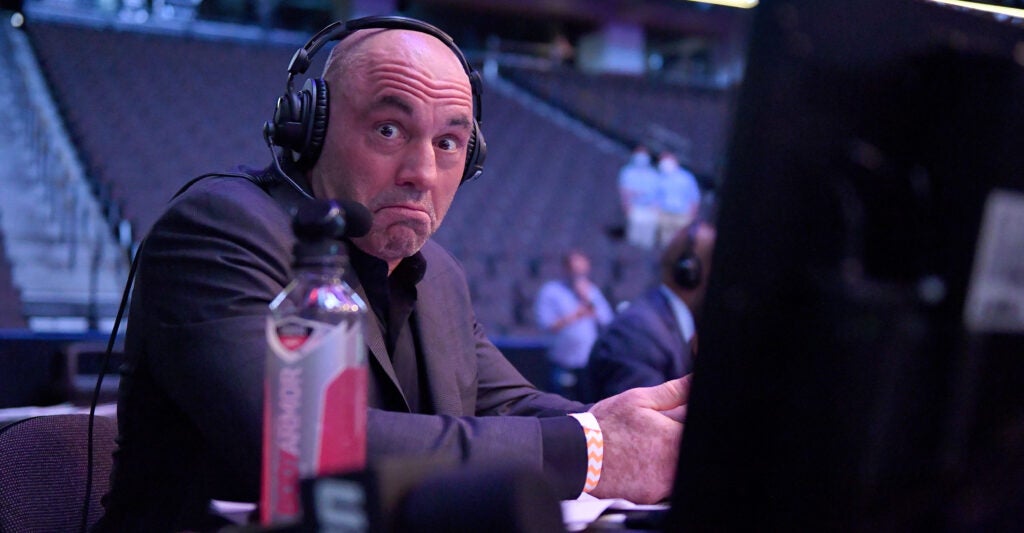Joe Rogan is amazing.
Five years ago, I left Fox to start Stossel TV. I left because I was frustrated by live TV. Guests talked so much, but said little.
I now produce videos like the ones I used to do on “20/20.” I like having a month or more to do research and then more time to edit the video into a short clip that explains complicated things, but is also fun to watch.
This edited model succeeded. Our short videos average 2 million views.
People are busy. They don’t want to sit through hours of live discussion. But then Rogan proved me wrong.
He talks to people, not for an hour, but often for three hours. Yet 11 million people stay to listen. Eleven million!
How does he do it? He had no journalism training. He acted on a sitcom and hosted the reality show “Fear Factor.” I happen to be a mixed martial arts fan, so I did notice that Rogan was the best commentator at UFC events. But hosting three hours of serious talk with intellectuals like physicist Brian Cox or mathematician Roger Penrose without the visual gimmicks that make TV bearable is very different.
So, I started listening to Rogan’s podcasts. Suddenly, I found myself spending an hour, sometimes three, with Rogan and his guests. I learned more than I learn watching TV news. I don’t really know how Rogan does it. Maybe it’s because he’s a good listener who asks good questions. He remembers what he learned from past interviews and uses those ideas when he questions other guests. He somehow makes three educational hours fun.
Now, Rogan is being criticized for broadcasting “misinformation.” He sometimes has anti-vaxxers on his show who claim COVID-19 vaccines are harmful. Rogan himself didn’t get vaccinated. He believes his natural immunity—he and his family had COVID-19—is enough protection. If he got COVID-19 again, he thinks it wouldn’t hurt him much because he’s fit, takes vitamins, etc.
I’m skeptical. I’m about to get my fourth dose of vaccine. But I still like hearing Rogan question anti-vaxxers and other people with unusual ideas. I learn from his show.
But other people say, “Rogan must be stopped. He kills people by broadcasting ‘misinformation.’” Also, “He’s racist because he said the ‘N-word.’”
Neil Young, Joni Mitchell, and some other musicians who I bet have never listened to Rogan pulled their music from Spotify, the service that carries his podcast. They and others demand Spotify drop his show. Spotify hasn’t.
And Rogan, unlike many people attacked by the mob, didn’t hide. He did what all of us should do if we’re attacked for something we say: fight back with more speech.
He quickly (without TV cosmetics; it looks like he shot it in his backyard) released a video on Instagram, pointing out, “Many of the things that we thought of as misinformation just a short while ago are now accepted as fact. … If you said, ‘I don’t think cloth masks work,’ you would be banned from social media. Now that’s openly and repeatedly stated on CNN. If you said, ‘I think it’s possible that COVID-19 came from a lab,’ you’d be banned from many social media platforms. Now that’s on the cover of Newsweek.”
Rogan is right. The smug arbiters of truth versus misinformation are often wrong. Then Rogan faced another controversy. A video of him using the “N-word” was circulated. Rogan apologized, but again fought back with more speech. He said he never called anyone the “N-word”; he’d only said it when others said it: “I was quoting a Lenny Bruce bit,” said Rogan. “Or a Paul Mooney bit. Or I was talking about how Quentin Tarantino used it repeatedly in ‘Pulp Fiction.’”
Rogan’s a comedian who’s done thousands of shows and hundreds of podcasts. Of course, he’ll make mistakes and offend some people. So what? He corrects his mistakes. Let Rogan speak.
COPYRIGHT 2022 BY JFS PRODUCTIONS INC.
The Daily Signal publishes a variety of perspectives. Nothing written here is to be construed as representing the views of The Heritage Foundation.
Have an opinion about this article? To sound off, please email letters@DailySignal.com and we’ll consider publishing your edited remarks in our regular “We Hear You” feature. Remember to include the url or headline of the article plus your name and town and/or state.
